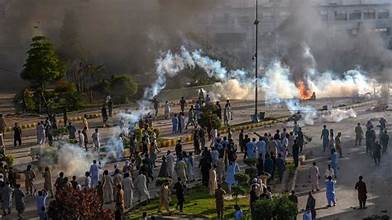Introduction
In today’s digital age, the protection of personal data has become one of the most pressing challenges for individuals and governments alike. Data breaches are no longer limited to isolated incidents; instead, they have become widespread, affecting millions of people across the globe. Recently, Pakistan has found itself in the spotlight after a shocking revelation made by the Chairman of the Pakistan Telecommunication Authority (PTA). He confirmed that Pakistani citizens’ sensitive personal data is available for sale on the dark web, shockingly priced at just Rs500. This revelation has sparked outrage, concern, and urgent calls for stronger cybersecurity measures.
This blog takes a closer look at the alarming situation, its causes, potential consequences, and the steps that Pakistan must take to protect its citizens from digital exploitation.
The Revelation by PTA Chairman
The confirmation from the PTA chairman has brought to light a harsh reality: the personal information of millions of Pakistanis is vulnerable and already being traded on illegal platforms. The dark web, known for hosting illicit activities, has become a marketplace where criminals sell stolen data at alarmingly low prices. That personal data, which should be safeguarded by institutions and organizations, is being sold for as little as Rs500 reflects both the scale of the breach and the negligence in protecting citizens’ digital identities.
The chairman’s statement also implies that breaches are not speculative—they are already happening. This acknowledgment raises serious concerns about the security infrastructure of government departments, financial institutions, and telecommunication companies, many of which collect and store citizens’ sensitive details.
What Type of Data Is Being Sold?
According to reports and cybersecurity experts, the data available on the dark web often includes:
- National Identity Card (NIC) details
- Phone numbers and addresses
- Bank account information
- Email addresses and passwords
- Medical and insurance records
- Biometric data in some cases
This kind of information can be used for identity theft, financial fraud, phishing attacks, and even for malicious activities such as impersonation in criminal acts. The fact that this sensitive data is accessible at such a low cost makes it an even bigger threat, as it enables widespread misuse.

Why Is Pakistani Data So Vulnerable?
Several factors contribute to the vulnerability of citizens’ data in Pakistan. Some of the most pressing reasons include:
- Weak Cybersecurity Infrastructure
Many government and private institutions still lack modern cybersecurity frameworks. Firewalls, encryption methods, and regular security audits are either outdated or missing altogether. - Negligence in Data Protection
Organizations often fail to take proactive steps to secure the personal information of their users. Weak password management systems and poor employee training add to the risk. - Lack of Regulatory Implementation
Although Pakistan has introduced laws related to data protection, including the Personal Data Protection Bill, their implementation remains weak. Inconsistencies and delays in enforcing these laws make institutions complacent. - High Demand on the Dark Web
Personal data has become a commodity in the digital black market. The high demand for Pakistani citizens’ information encourages hackers to target poorly protected systems. - Data Centralization Without Adequate Security
Government initiatives such as NADRA have centralized personal data. While beneficial for efficiency, centralized systems also present a single high-value target for cybercriminals.
Consequences of Data Breaches
The sale of Pakistani citizens’ data on the dark web is not just a cybersecurity issue; it has far-reaching consequences for individuals, businesses, and national security.
- Financial Fraud
Hackers and scammers can use stolen information to gain unauthorized access to bank accounts, apply for loans, or commit credit card fraud in the name of unsuspecting individuals. - Identity Theft
Criminals can impersonate citizens to commit crimes, making innocent people face serious legal complications. - Loss of Trust
When citizens realize their data is not secure, trust in government institutions, telecom companies, and banks erodes. This mistrust weakens public confidence in digital transformation initiatives. - National Security Threats
Sensitive information falling into the wrong hands can be exploited for espionage, terrorism, or foreign interference in national affairs. - Impact on Digital Economy
Pakistan has been working to digitize its economy and promote online banking, e-commerce, and digital services. Large-scale data breaches discourage citizens from adopting these systems, slowing economic growth.
PTA Chairman Confirms Pakistani Citizens’ Data Being Sold on Dark Web for Rs500
The Role of Government and Institutions
The confirmation by the PTA chairman should act as a wake-up call for all stakeholders. Here are some immediate steps that must be taken:
- Strengthening Cybersecurity Laws
Enforce strict penalties for organizations that fail to protect user data and make cybersecurity compliance mandatory across all sectors. - Establishing a National Cybersecurity Authority
A centralized body dedicated to monitoring, preventing, and responding to cyberattacks must be established with adequate resources. - Regular Security Audits
All institutions holding citizens’ data must undergo periodic cybersecurity audits to identify and fix vulnerabilities. - Public Awareness Campaigns
Citizens must be educated on how to protect themselves online, such as avoiding suspicious links, using strong passwords, and enabling two-factor authentication. - Collaboration with Global Experts
Cybercrime is a borderless issue. Pakistan must collaborate with international cybersecurity experts and organizations to learn and adopt best practices.

How Can Citizens Protect Themselves?
While systemic reforms take time, individuals can take immediate steps to secure their personal information:
- Use strong and unique passwords for different platforms.
- Enable two-factor authentication (2FA) on banking apps and email accounts.
- Avoid clicking on suspicious links or attachments.
- Regularly update software and antivirus programs.
- Monitor bank and mobile account activity to spot unauthorized transactions.
- Limit sharing of personal information on public platforms.
These simple steps, while not foolproof, significantly reduce the risk of becoming a victim of cybercrime.
Moving Forward: Building a Culture of Cybersecurity
The confirmation that Pakistani citizens’ data is being sold on the dark web for as little as Rs500 is a chilling reminder that data protection cannot be taken lightly. Pakistan must urgently build a culture of cybersecurity—one where every institution, business, and individual recognizes the importance of safeguarding personal information.
For the government, this means implementing strict data protection laws and ensuring accountability. For businesses, it means investing in advanced security tools and employee training. For citizens, it means being cautious in their digital interactions.
Only through a collective effort can Pakistan hope to address this growing crisis and protect its people from the devastating consequences of data breaches.
Conclusion
The sale of Pakistani citizens’ data on the dark web is a wake-up call that should not be ignored. The fact that such sensitive information can be accessed for as little as Rs500 highlights the urgent need for reform. The PTA chairman’s confirmation should serve as a catalyst for action—prompting government institutions, private organizations, and citizens to strengthen cybersecurity practices.
In a world where data has become as valuable as gold, Pakistan cannot afford to let its citizens’ information fall into the wrong hands. The time for action is now, before the consequences become irreversible.



